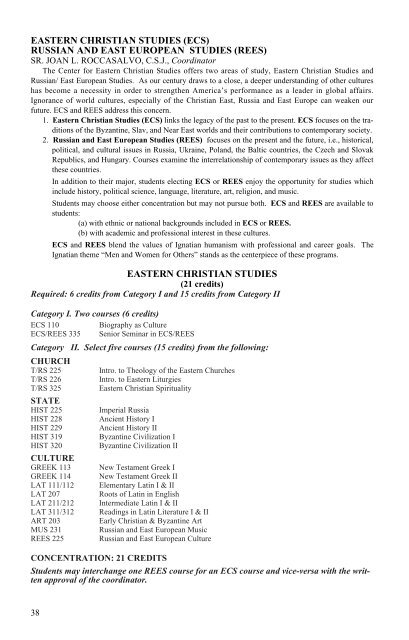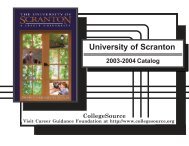Create successful ePaper yourself
Turn your PDF publications into a flip-book with our unique Google optimized e-Paper software.
EASTERN CHRISTIAN STUDIES (ECS)<br />
RUSSIAN AND EAST EUROPEAN STUDIES (REES)<br />
SR. JOAN L. ROCCASALVO, C.S.J., Coordinator<br />
<strong>The</strong> Center for Eastern Christian Studies <strong>of</strong>fers two areas <strong>of</strong> study, Eastern Christian Studies and<br />
Russian/ East European Studies. As our century draws to a close, a deeper understanding <strong>of</strong> other cultures<br />
has become a necessity in order to strengthen America’s performance as a leader in global affairs.<br />
Ignorance <strong>of</strong> world cultures, especially <strong>of</strong> the Christian East, Russia and East Europe can weaken our<br />
future. ECS and REES address this concern.<br />
1. Eastern Christian Studies (ECS) links the legacy <strong>of</strong> the past to the present. ECS focuses on the traditions<br />
<strong>of</strong> the Byzantine, Slav, and Near East worlds and their contributions to contemporary society.<br />
2. Russian and East European Studies (REES) focuses on the present and the future, i.e., historical,<br />
political, and cultural issues in Russia, Ukraine, Poland, the Baltic countries, the Czech and Slovak<br />
Republics, and Hungary. Courses examine the interrelationship <strong>of</strong> contemporary issues as they affect<br />
these countries.<br />
In addition to their major, students electing ECS or REES enjoy the opportunity for studies which<br />
include history, political science, language, literature, art, religion, and music.<br />
Students may choose either concentration but may not pursue both. ECS and REES are available to<br />
students:<br />
(a) with ethnic or national backgrounds included in ECS or REES.<br />
(b) with academic and pr<strong>of</strong>essional interest in these cultures.<br />
ECS and REES blend the values <strong>of</strong> Ignatian humanism with pr<strong>of</strong>essional and career goals. <strong>The</strong><br />
Ignatian theme “Men and Women for Others” stands as the centerpiece <strong>of</strong> these programs.<br />
EASTERN CHRISTIAN STUDIES<br />
(21 credits)<br />
Required: 6 credits from Category I and 15 credits from Category II<br />
Category I. Two courses (6 credits)<br />
ECS 110 Biography as Culture<br />
ECS/REES 335 Senior Seminar in ECS/REES<br />
Category II. Select five courses (15 credits) from the following:<br />
CHURCH<br />
T/RS 225 Intro. to <strong>The</strong>ology <strong>of</strong> the Eastern Churches<br />
T/RS 226 Intro. to Eastern Liturgies<br />
T/RS 325 Eastern Christian Spirituality<br />
STATE<br />
HIST 225 Imperial Russia<br />
HIST 228 Ancient History I<br />
HIST 229 Ancient History II<br />
HIST 319 Byzantine Civilization I<br />
HIST 320 Byzantine Civilization II<br />
CULTURE<br />
GREEK 113 New Testament Greek I<br />
GREEK 114 New Testament Greek II<br />
LAT 111/112 Elementary Latin I & II<br />
LAT 207 Roots <strong>of</strong> Latin in English<br />
LAT 211/212 Intermediate Latin I & II<br />
LAT 311/312 Readings in Latin Literature I & II<br />
ART 203 Early Christian & Byzantine Art<br />
MUS 231 Russian and East European Music<br />
REES 225 Russian and East European Culture<br />
CONCENTRATION: 21 CREDITS<br />
Students may interchange one REES course for an ECS course and vice-versa with the written<br />
approval <strong>of</strong> the coordinator.<br />
38
















